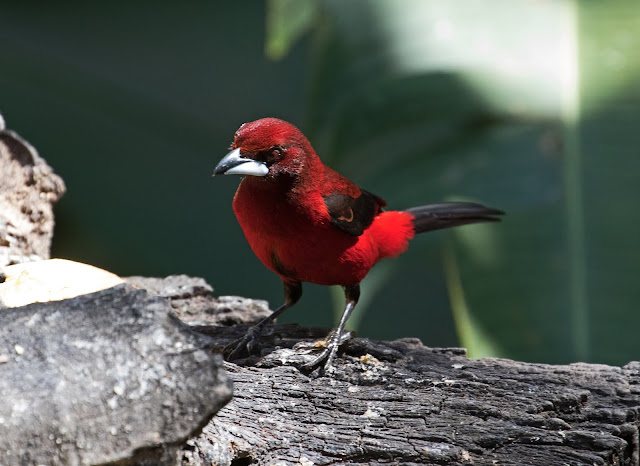As I now sit and try to compose my diary and photographic record I realise the imposition of the travel was minor, compared with the huge rewards of seeing the immense bio diversity of the rain forest. Six days where just about everything was new, every minute filled with something to see and record - well that's when it wasn't raining - we were in the rainy season so what do you expect. Of course how could it be the rain forest without the odd downpour or two. That said, our first three days were dry and hot, perfect for seeing butterflies.
I start with an apology, some of these blogs are overly large but it is my diary and context is everything. Today we logged 122 Butterfly species, most of them new to me and I attempted to photograph as many as I could which means they are of mixed quality. I photographed the subjects as they came, no time to be picky and I am amazed by how much damage some of these butterflies have suffered. However, by the end of the week I must have seen countless flycatchers and one stole a butterfly from under my nose.
So, as day one dawned and with my body clock somewhere in front of me, I made my way to the lodge, primarily for a much needed coffee, but really to watch the dawn come up. Slowly the insect cacophony diminished and both butterflies and birds took to the wing. My first encounter in the dim light was probably a Pale Owl-Butterfly, Caligo telamonius menus, too dark for a positive ID but subsequent sightings were recorded in the same place.
In front of the lodge a Zygia tree was in full bloom, the overpowering scent so strong that it seemed to be flavouring my early morning brew. Naturally the butterflies were interested and they were searching out nectar in the twilight.
 |
| Butterflies nectaring before sun up - How odd!! |
The morning continued in the same vein, everything new and coming fast, until a timely stop for breakfast. I swear that through breakfast most people had one eye on the garden, ready to grab the camera and capture another specimen. Post breakfast we had more time around the lodge until setting off for our first location - Las Minas.
 |
| Alana White-Skipper, Heliopetes alana |
 |
| Banded Peacock, Anartia fatima |
 |
| Bright Brangas, Brangas getus |
 |
| Clio Crescent, Eresia clio |
 |
| Common Blue-Skipper, Quadrus cerialis |
 |
| Crimson-patch Checkerspot, Chlosyne janais |
 |
| Crimson-patch Checkerspot, Chlosyne janais |
 |
| Cydno Longwing, Heliconius cydno chioneus |
 |
| Cydno Longwing, Heliconius cydno chioneus |
 |
| Deep-green Hairstreak, Theritas mavors |
 |
| Diasia Clearwing, Ithomia diasia hippocrenis |
 |
| Diasia Clearwing, Ithomia diasia hippocrenis |
 |
| Dinora Metalmark, Brachyglenis dinora |
 |
| Dot-collared Firetip, Jemadia pseudognetus |
 |
| Esmeralda Longtail, Urbanus esmeraldus |
 |
| Godman's Sarota, Sarota myrtea |
 |
| Godman's Sarota, Sarota myrtea |
 |
| Great Southern White, Ascia monuste |
 |
| Iphinassa Clearwing, Ithomia iphianassa |
 |
| King's Leafwing, Memphis kingi |
 |
| King's Leafwing, Memphis kingi |
 |
| Lagora Metalmark, Leucochimona lagora |
 |
| Lampeto Metalmark, Caria mantinea lampeto |
 |
| Malachite, Siproeta stelenes |
 |
| Many-banded Daggerwing, Marpesia chiron |
 |
| Mimic Crescent, Castilia eranites |
 |
| Mimic Crescent, Castilia eranites |
 |
| Narva Checkerspot, Chlosyne narva |
 |
| Narva Checkerspot, Chlosyne narva |
 |
| Orange Mapwing, Hypanartia lethe |
 |
| Orange Patch Crescent, Anthanassa d. drusilla |
 |
| Orange Patch Crescent, Anthanassa d. drusilla |
 |
| Orange Patch Crescent, Anthanassa d. drusilla |
 |
| Orange Striped Emesis, Emesis cypria |
 |
| Pale Sicklewing, Achlyodes pallida |
 |
| Banded Peacock, Anartia fatima |
 |
| Simple Sarota, Sarota acantus |
 |
| Six-spotted Eighty-eight. Callicore lyca |
 |
| Six-spotted Eighty-eight. Callicore lyca |
 |
| Seven lifers in one shot. |
 |
| Teleus Longtail, Urbanus teleus |
 |
| Teleus Longtail, Urbanus teleus |
 |
| Togarna Hairstreal, Arawacus togarna |
 |
| Two-barred Flasher, Astraptes fulgerator |
 |
| Variable Crescent, Eresia ithomioides alsina |
 |
| Violet tipped Saliana, Saliana saladin?? |
 |
| White dotted Crescent, Castilia ofella |
The fruit on the bird tables proved just as popular with the butterflies.
 |
| Cytheria Sister, Adelpha cytherea |
 |
| Common Morpho, Morpho helenor peleides |
Work in progress - how come they look so different when you get home. Unlike Europe, there is no concise "Collins Guide to Panama's Butterflies". Careful sifting through Jeffery Glassbergs Butterflies of Mexico and Central America helps, as does the Butterflies of America website. Previous reports and the Canopy website are other sources of information. Not easy as the checklist for the Canopy Lodge and Tower comprises some 970 species.
And now a few birds that managed to distract me during the day. I was particularly pleased to catch up with the Rufous Motmot.
 |
| Blue-grey Tanager, Thraupis episcopus |
 |
| Crimson-backed Tanager, Ramphocelus dimidiatus |
 |
| Crimson-backed Tanager, Ramphocelus dimidiatus |
 |
| Crimson-backed Tanager, Ramphocelus dimidiatus |
 |
| Clay-coloured Thrush, Turdus grayi |
 |
| Rufous Motmot, Baryphthengus martii |
 |
| Rufous Motmot, Baryphthengus martii |
 |
| Rufous Motmot, Baryphthengus martii |
 |
| Thick billed Euphonia, Euphonia laniirostris |
 |
| Thick billed Euphonia, Euphonia laniirostris |
Of course bugs are everywhere - they grow big here....
....colourful too.....
......even the flies....
.... and unidentifiable to mere mortals.
Friendly Stick Insects
The only mammal of the day - a Red-tailed Squirrel raiding the bananas from the bird tables.












No comments:
Post a Comment